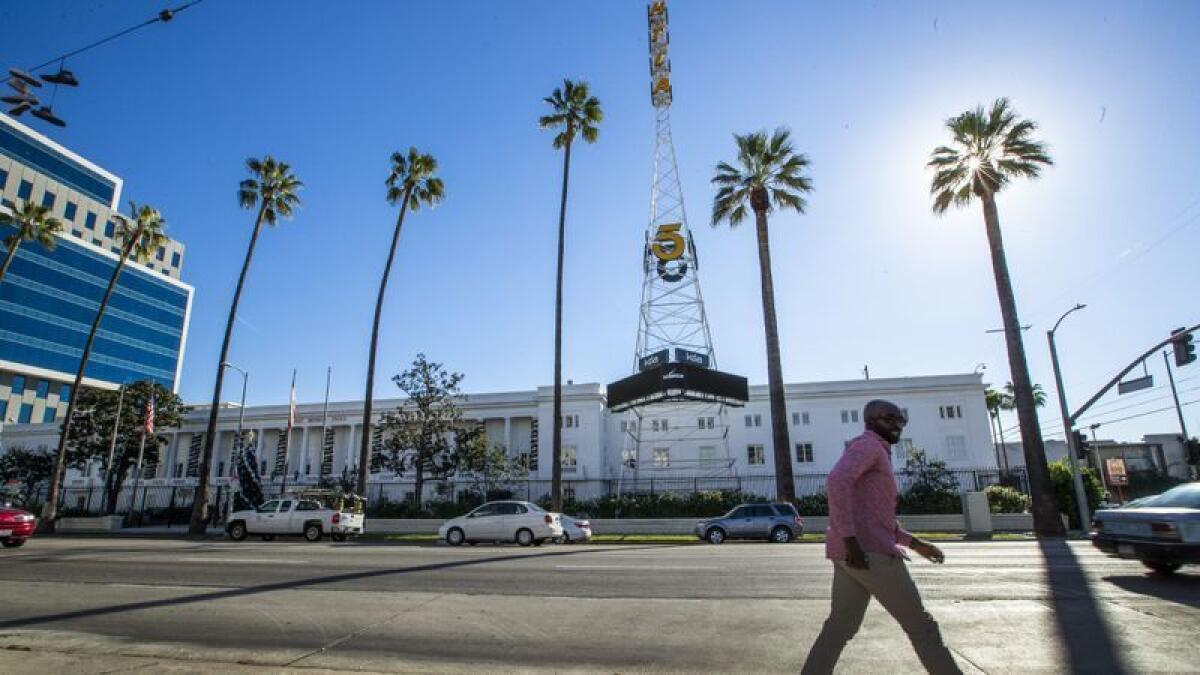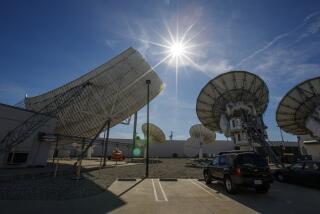Blackout ends: Tribune Media TV stations, including KTLA, return to Charter Spectrum

- Share via
A bitter showdown ended early Friday when Tribune Media and Charter Communications agreed to a new distribution deal, restoring the signals of nearly three dozen television stations, including KTLA Channel 5 in Los Angeles and KSWB Channel 5 in San Diego, to Charter’s Spectrum pay-TV service.
The pact resolved a nine-day blackout of Tribune Media stations — an outage that affected more than 6 million Charter Spectrum cable TV homes nationwide, including 1.5 million in the Los Angeles region.
“We are pleased to have reached this agreement that will return Tribune Broadcasting’s local television stations and WGN America to Spectrum customers and Tribune’s viewers,” the two companies said in a joint statement early Friday.
Terms of the distribution agreement were not disclosed.
The two companies had been locked in a three-week standoff over fee increases that Tribune Media was seeking for its programming. Two deadlines passed without an agreement, and Tribune Media channels, including WGN America, were pulled from the Spectrum service Jan. 2.
Pictures in the News | Friday Jan. 11, 2019 »
Spectrum customers were caught in the crossfire. Instead of programming, Charter aired a message that blamed Tribune Media for demanding a “ridiculous increase” in the fees that it charged for the right to rebroadcast its stations’ over-the-air signals.
Tribune Media insisted that its proposed fee increases were reasonable.
“We are asking only for a fair deal, one that is comparable to what every other cable and satellite TV provider pays us for our content,” Tribune Media Chief Executive Peter Kern said in an open letter to viewers earlier this week. “We want nothing more than to have a good working relationship with Spectrum and to get our channels back on the air at a fair price.”
The prospect of football fans missing the NFL playoffs helped spur the two companies to reach an accord, people familiar with the negotiations said. Tribune Media owns about two dozen Fox affiliate stations, including KSWB in San Diego and KCPQ Channel 13 in Seattle, and Fox is home to NFL football. Tribune also has Fox affiliates in Sacramento, Kansas City, St. Louis, Cleveland and Indianapolis.
Tribune also owns a handful of CBS affiliate stations, and CBS is also an important NFL partner.
In Los Angeles and Ventura counties, viewers missed KTLA’s popular morning newscasts and CW programming in prime time. Viewers who had a digital antenna could still receive KTLA and the other stations because they broadcast an over-the-air signal.
The companies’ previous contract expired on New Year’s Eve, but the two sides agreed to a short-term extension to bridge the New Year’s holiday. The reprieve allowed Southern California viewers to see KTLA’s popular broadcast of the Tournament of Roses Parade.
Some customers vented about the blackout on social media.
“What a joke! This just makes me want to go back to DirecTV! I switched a year ago only to be able to watch the Dodgers, but have found Spectrum service to be inferior,” one Southern California customer who identified himself as Robert Ramirez wrote on Twitter. Another person complained: “This may be the last straw for me. I look forward to watching KTLA every morning. My bill has doubled in the last two years and now my favorite news station is missing.”
But other customers, weary of rising cable bills, urged Charter to hang tough in the negotiations.
Charter and other cable operators have struggled to control programming costs in an effort to halt a migration of customers to lower-cost streaming services. The pay-TV industry was projected to lose 1.1 million customers in 2018, including more than 200,000 cable TV subscribers from Charter, according to recent estimates from MoffettNathanson Research.
There were about 140 television blackouts in 2018. An impasse between Verizon Communications Inc. and TV broadcaster Tegna Inc. resulted in an outage Monday of network affiliate stations in Washington, D.C., Norfolk, Va., and Buffalo, N.Y., on Verizon Fios systems.
Blackouts in 2018 were down from a record 213 outages in 2017, according to the American Television Alliance, a Washington lobbying group that represents pay-TV operators.
The conflict is over so-called retransmission fees — the money that cable, satellite TV and telephone companies must pay to broadcast local TV station signals as part of their channel lineups. Television station owners in 2018 collected a combined $10 billion in such fees, up from $9.3 billion in 2017, according to the alliance.
Twitter: @MegJamesLAT
More to Read
Inside the business of entertainment
The Wide Shot brings you news, analysis and insights on everything from streaming wars to production — and what it all means for the future.
You may occasionally receive promotional content from the Los Angeles Times.











